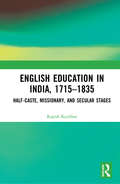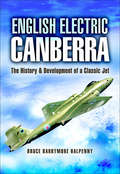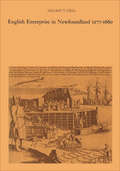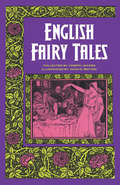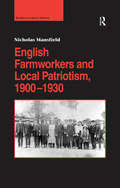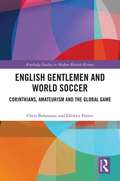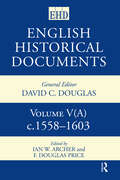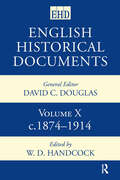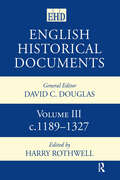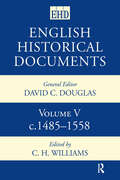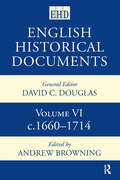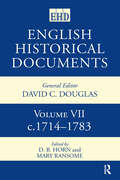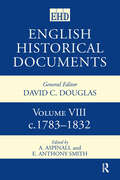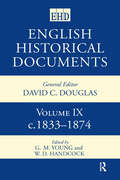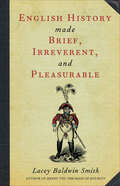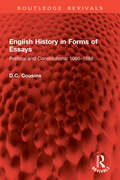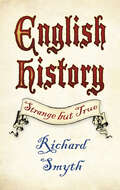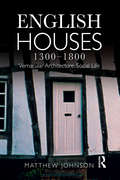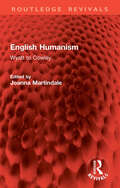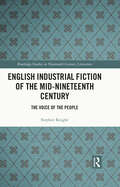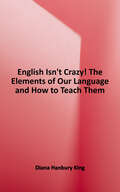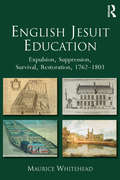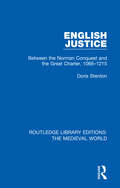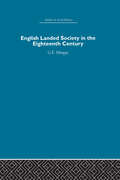- Table View
- List View
English Education in India, 1715-1835: Half-Caste, Missionary, and Secular Stages
by Rajesh KochharThis book identifies and describes the first stage in the advent and growth of English education in India. The first schools in India were the charity schools, asylums and orphanages opened under the auspices of the Church of England for religious instruction, training and care of ‘half-caste’ or mixed-race children, the progeny of Protestant fathers from Indian women. It examines the influence of the ‘half-caste’ community and the missionaries on the growing Indian demand for English education and opportunities for employment. The well-entrenched scenarios on the pre-history of Hindoo College Calcutta are re-examined in the light of new evidence discussed here for the first time. The book further analyses the shifts in the educational policies by the British colonial administrators and the interventions by the likes of Trevelyan, Macaulay and Bentinck. Detailed and insightful, this volume will be of great interest to students and researchers of history, literature, postcolonial studies, cultural studies, colonial expansion, and South Asian studies.
English Electric Canberra: The History & Development of a Classic Jet (Pen And Sword Large Format Aviation Bks)
by Bruce Barrymore Halpenny&“A useful review of the development of a classic jet bomber that saw widespread service in the Royal Air Force and was exported to many overseas air forces.&” —Aeromilitaria This amazing airplane first flew in 1949 and is still in front-line service with the RAF. It has served in a variety of roles including those of tactical bomber, photo-reconnaissance, navigational trainer, maritime strike, electronic countermeasures and target-towing. It was manufactured in the USA under license as the Martin B-57 and has been exported to Argentina, Chile, India, Peru, South Africa and other Commonwealth countries. This book looks at the development of the aircraft during the early days of jet power and especially at its Rolls-Royce Avon powerplant. Each of the many marks and variants are described and illustrated by many remarkable and rare photographs. The type&’s record of service with RAF squadrons throughout its service life is given together with descriptions of the many experimental models that were used in the development of a variety of weapons and avionic systems. &“For an aircraft that has been the subject of countless books, the author still found a remarkable wealth of previously unpublished material on Canberra operations. A classic aircraft given the proper coverage it so richly deserves.&” —Airfix Model World &“A wonderfully researched tribute to this remarkable achievement, with a plethora of excellent photographs . . . Essential reading for any aviation enthusiast.&” —Pegasus Archive
English Enterprise in Newfoundland 1577-1660
by Gillian CellBetween 1577 and 1660 Newfoundland emerged from relative obscurity to become the centre of a booming and valued industry, the site of one of England's first colonies, and a place of such strategic importance that the English government could not afford to ignore it. From the time of its discovery in the late fifteenth century, the fishermen of Western Europe made annual fishing voyages to Newfoundland. Over a hundred years later, in 1610, the island became the site of England's second permanent colony in North America. The conflict which began at that time between settlers and fishermen has characterized much of the island's history. This volume examines the two themes of settlement and the fishery. The value of the fishery has been accepted readily enough, but until now no systematic analysis has been made of the industry's growth during its first great period of expansion in the last quarter of the sixteenth century or of its position in the commerce of the ports of western England. Such an analysis is presented in this volume. The author has used customs' records and local port records, summarizing her finds in tables and graphs. While the figures are incomplete and the conclusions drawn from them necessarily tentative, this book is nevertheless an important step in charting the development of England's first transatlantic trade.The earliest attempts to colonize the unsympathetic island of Newfoundland are the least known part of the story of English settlement in North America. Now, thanks to the use of new documentation, in particular a substantial collection of papers relating to the Newfoundland Company, it can be argued that both the company's colony at Cupid Cove and the independent settlements which were its offshoots were far more serious and long-lived enterprises than has often been though. They formed a vital part of the colonial experiences and experiments of the seventeenth century.The story of English activity in Newfoundland sheds further light on the expansion of England. Both the fishing voyages and the first settlements were originally private ventures. But as the European rivalries in the New World continued and as mercantilist theories made colonies increasingly valuable assets, so Newfoundland's importance as a training ground for sailors and as a strategic element in the control of the north Atlantic became more obvious. By the mid-seventeenth century Newfoundland had ceased to be simply a private concern. Somewhat slowly, somewhat reluctantly, the government moved in.
English Fairy Tales (Dover Children's Classics)
by Joseph JacobsMany generations of children have enjoyed the enduringly popular fairy tale collections of Joseph Jacobs, one of England's foremost folklorists. Through every change of fashion, their ability to delight and entertain has continued undiminished. The king and queens, the wicked giants, the clever youngest sons, the talking animals and trees, the magic cloaks that make their wearers invisible—these elements stirred the imagination of our parents and ourselves, and will give as much pleasure to our children.In this first of Jacobs' collections, many of the 43 tales will be familiar. Included are "Jack and the Beanstalk," "The Story of the Three Bears," "Henny Penny," and others. The tale of Mr. and Mrs. Vinegar who lived in a vinegar bottle, the story of "Nix Nought Nothing," of "Mollie Whuppie," and of many others are less well known and will offer a refreshing change from the well-worn favorites.
English Farmworkers and Local Patriotism, 1900–1930 (Studies in Labour History)
by Nicholas MansfieldThis new study looks at the ways in which the years surrounding the First World War shaped the lives of the rural workforce in Britain and how the patriotism unleashed by the war was used by those in power to blur class divisions and build conservative attitudes in rural communities. Using the area of Shropshire and the Marches as a focus, the book looks at farmworkers and their trade unions, the structures of agrarian economy, class divisions, local loyalties, cultural institutions and political organisations. From 1917 the growing power of the farmworkers’ unions and the rural labour movement mounted a challenge to the landed elites and sought a radical change from rural poverty. The author shows how the elites met this threat dynamically by creating a range of new village institutions, such as ploughing matches, Women’s Institutes, village halls, war memorials and the British Legion. The extraordinary growth of rural radicalism at the end of the war was diffused by popular conservatism and local patriotism. Influenced by wartime experiences, the period 1900-1930 saw a change in rural society from parochial concerns to a new sense of loyalty to county and to the English nation.
English Gentlemen and World Soccer: Corinthians, Amateurism and the Global Game (Routledge Studies in Modern British History)
by Chris Bolsmann Dilwyn PorterThe significance of the Corinthians Football Club, founded in 1882, has been widely acknowledged by historians of football and by sports historians generally. As a ’super club’ comprising the best amateur talent available they were an important formative influence on football in Britain from the 1880s to the 1930s. As a touring club - they first travelled to South Africa in 1897 and made regular forays into Europe and also to Canada, the United States and Brazil - they were the self-proclaimed standard bearers for gentlemanly values in sport. Indeed for many years they were most famous football club in the world, drawing huge crowds and helping to ensure that the version of football emanating from the English public schools and universities in the mid-nineteenth century became a global game. Though their playing strength and influence waned after the First World War, they remained a significant force through to 1939, upholding ’true blue’ amateurism at a time when football was increasingly associated with professionalism and seen as a branch of commercial entertainment. Whilst much has been written about the Corinthians, mainly by club insiders, this is the first complete scholarly history to cover their activities both in England and in other parts of the world. It critically reassesses the club’s role in the development of football and fills a gap in existing literature on the relationship between the progress of the game in England and globally. Most crucially, the book re-examines the sporting ideology of gentlemanly amateurism within the context of late-nineteenth century and early-twentieth century society.
English Historical Documents 1558-1603 (English Historical Documents)
by Ian W. Archer F. Douglas PricePraise for the series:‘Perhaps the most important historical undertaking of our age... one of the most valuable historical works ever produced.’ Times Literary Supplement‘A landmark in the field of historical endeavour... the most admirable collection of sources on English history that exists.’ American Historical Review English Historical Documents is the most ambitious, impressive and comprehensive collection of primary documents on English history ever published. The volumes have each become landmark publications in their own fields. This long awaited volume covers 1558-1603, the reign of Elizabeth I, when government, culture, religion and foreign policy all underwent profound change. This volume includes informative introductory pieces for the parts and sections and editorial comment is directed towards making sources intelligible rather than drawing conclusions from them. Opening with an introductory section which contextualises the accession of Elizabeth to the throne, the volume covers all key aspects of the Elizabethan period, including:InstitutionsSocial and economic structuresThe marriage question and the problem of the successionFamily and householdCultural lifeThe Church and religious affairsElizabethan warsOverseas trade and explorationCrime and disorderThe format of the series has been updated and the documents gathered here encompass the most up to date approaches to the material.
English Historical Documents: Volume 10 1874-1914 (English Historical Documents)
by W. D. Handcock G. M. YoungEnglish Historical Documents is the most ambitious, impressive and comprehensive collection of documents on English history ever published. An authoritative work of primary evidence, each volume presents material with exemplary scholarly accuracy. Editorial comment is directed towards making sources intelligible rather than drawing conclusions from them. Full account has been taken of modern textual criticism. A general introduction to each volume portrays the character of the period under review and critical bibliographies have been added to assist further investigation. Documents collected include treaties, personal letters, statutes, military dispatches, diaries, declarations, newspaper articles, government and cabinet proceedings, orders, acts, sermons, pamphlets, agricultural instructions, charters, grants, guild regulations and voting records. Volumes are furnished with lavish extra apparatus including genealogical tables, lists of officials, chronologies, diagrams, graphs and maps.
English Historical Documents: Volume 3 1189-1327 (English Historical Documents)
by Harry Rothwell David C. DouglasEnglish Historical Documents is the most ambitious, impressive and comprehensive collection of documents on English history ever published. An authoritative work of primary evidence, each volume presents material with exemplary scholarly accuracy. Editorial comment is directed towards making sources intelligible rather than drawing conclusions from them. Full account has been taken of modern textual criticism. A general introduction to each volume portrays the character of the period under review and critical bibliographies have been added to assist further investigation. Documents collected include treaties, personal letters, statutes, military dispatches, diaries, declarations, newspaper articles, government and cabinet proceedings, orders, acts, sermons, pamphlets, agricultural instructions, charters, grants, guild regulations and voting records. Volumes are furnished with lavish extra apparatus including genealogical tables, lists of officials, chronologies, diagrams, graphs and maps.
English Historical Documents: Volume 5 1485-1558 (English Historical Documents)
by C. H. WilliamsEnglish Historical Documents is the most ambitious, impressive and comprehensive collection of documents on English history ever published. An authoritative work of primary evidence, each volume presents material with exemplary scholarly accuracy. Editorial comment is directed towards making sources intelligible rather than drawing conclusions from them. Full account has been taken of modern textual criticism. A general introduction to each volume portrays the character of the period under review and critical bibliographies have been added to assist further investigation. Documents collected include treaties, personal letters, statutes, military dispatches, diaries, declarations, newspaper articles, government and cabinet proceedings, orders, acts, sermons, pamphlets, agricultural instructions, charters, grants, guild regulations and voting records. Volumes are furnished with lavish extra apparatus including genealogical tables, lists of officials, chronologies, diagrams, graphs and maps.
English Historical Documents: Volume 6 1660-1714 (English Historical Documents)
by Andrew BrowningEnglish Historical Documents is the most ambitious, impressive and comprehensive collection of documents on English history ever published. An authoritative work of primary evidence, each volume presents material with exemplary scholarly accuracy. Editorial comment is directed towards making sources intelligible rather than drawing conclusions from them. Full account has been taken of modern textual criticism. A general introduction to each volume portrays the character of the period under review and critical bibliographies have been added to assist further investigation. Documents collected include treaties, personal letters, statutes, military dispatches, diaries, declarations, newspaper articles, government and cabinet proceedings, orders, acts, sermons, pamphlets, agricultural instructions, charters, grants, guild regulations and voting records. Volumes are furnished with lavish extra apparatus including genealogical tables, lists of officials, chronologies, diagrams, graphs and maps.
English Historical Documents: Volume 7 1714-1783 (English Historical Documents)
by D. B. Horn Mary RansomeEnglish Historical Documents is the most ambitious, impressive and comprehensive collection of documents on English history ever published. An authoritative work of primary evidence, each volume presents material with exemplary scholarly accuracy. Editorial comment is directed towards making sources intelligible rather than drawing conclusions from them. Full account has been taken of modern textual criticism. A general introduction to each volume portrays the character of the period under review and critical bibliographies have been added to assist further investigation. Documents collected include treaties, personal letters, statutes, military dispatches, diaries, declarations, newspaper articles, government and cabinet proceedings, orders, acts, sermons, pamphlets, agricultural instructions, charters, grants, guild regulations and voting records. Volumes are furnished with lavish extra apparatus including genealogical tables, lists of officials, chronologies, diagrams, graphs and maps.
English Historical Documents: Volume 8 1783-1832 (English Historical Documents)
by A. Aspinall E. Anthony SmithEnglish Historical Documents is the most ambitious, impressive and comprehensive collection of documents on English history ever published. An authoritative work of primary evidence, each volume presents material with exemplary scholarly accuracy. Editorial comment is directed towards making sources intelligible rather than drawing conclusions from them. Full account has been taken of modern textual criticism. A general introduction to each volume portrays the character of the period under review and critical bibliographies have been added to assist further investigation. Documents collected include treaties, personal letters, statutes, military dispatches, diaries, declarations, newspaper articles, government and cabinet proceedings, orders, acts, sermons, pamphlets, agricultural instructions, charters, grants, guild regulations and voting records. Volumes are furnished with lavish extra apparatus including genealogical tables, lists of officials, chronologies, diagrams, graphs and maps.
English Historical Documents: Volume 9 1833-1874 (English Historical Documents)
by W. D. Handcock G. M. YoungEnglish Historical Documents is the most ambitious, impressive and comprehensive collection of documents on English history ever published. An authoritative work of primary evidence, each volume presents material with exemplary scholarly accuracy. Editorial comment is directed towards making sources intelligible rather than drawing conclusions from them. Full account has been taken of modern textual criticism. A general introduction to each volume portrays the character of the period under review and critical bibliographies have been added to assist further investigation. Documents collected include treaties, personal letters, statutes, military dispatches, diaries, declarations, newspaper articles, government and cabinet proceedings, orders, acts, sermons, pamphlets, agricultural instructions, charters, grants, guild regulations and voting records. Volumes are furnished with lavish extra apparatus including genealogical tables, lists of officials, chronologies, diagrams, graphs and maps.
English History Made Brief, Irreverent, and Pleasurable
by Lacey Baldwin SmithHere at last is a history of England that is designed to entertain as well as inform and that will delight the armchair traveler, the tourist or just about anyone interested in history. No people have engendered quite so much acclaim or earned so much censure as the English: extolled as the Athenians of modern times, yet hammered for their self-satisfaction and hypocrisy. But their history has been a spectacular one. The guiding principle of this book's heretical approach is that "history is not everything that happened, but what is worth remembering about the past.. . .". Thus, its chapters deal mainly with "Memorable History" in blocks of time over the centuries. The final chapter "The Royal Soap Opera," recounts the achievements, personalities and idiocies of the royal family since the arrival of William the Conqueror in 1066. Spiced with dozens of hilarious cartoons from Punch and other publications, English History will be a welcome and amusing tour of a land that has always fascinated Anglophiles and Anglophobes alike.
English History in Forms of Essays: Political and Constitutional 1066–1688 (Routledge Revivals)
by D.C. CousinsEnglish History in Forms of Essays (1927) is an audacious and ambitious history of England in an abbreviated form of entries that both illuminate and provide openings for further research.
English History: Strange but True
by Richard SmythThis book is a treasure trove of English oddities, crammed with the most curious stories, remarkable facts and unexpected goings-on from the country’s long and convoluted history. From frogs’ legs at Stonehenge to knicker elastic in the Blitz, this is England – the unauthorised biography.
English Houses 1300-1800: Vernacular Architecture, Social Life
by Matthew. H JohnsonHouses are more than a shelter from the elements: they also offer an unparalleled insight into the beliefs, ideas and experiences of the people who built and lived in them. In this engaging book, Matthew Johnson looks at the traditional houses that still exist throughout the English countryside and examines the lives of the ordinary people who once occupied them. His wide-ranging narrative takes in the medieval hall and the community it framed; the rebuilding and 'improvement'of houses in the sixteenth and seventeenth centuries; and the rise of the Georgian Order in both architecture and eighteenth century culture. This passionate book is animated by the conviction that old houses are much more than just pretty tableaux of an idyllic, unchanging rural England. Vernacular houses are compared to their larger, 'polite' counterparts, and English houses are placed in the wider context of the British Isles and the Atlantic world beyond. The result is a dynamic, compelling account of the development of houses in the English countryside and through this, a portrait of changing patterns of social life from medieval to modern times. Richly illustrated throughout with photographs and drawings, this book will be of interest to anyone who wants to understand the significance of our built heritage and the historic landscape.
English Humanism: Wyatt to Cowley (Routledge Revivals)
by Joanna MartindaleThe literature of the English Renaissance demands some attention to the intellectual and educational background which produced it, in order to be seen in proper perspective. The selection in this book, originally published in 1985, both illustrate the intellectual climate of the English Renaissance and exemplify some of its characteristics, though not strictly literary products. These include education, classicism and imitation, wisdom and eloquence, history and moral philosophy, religion and vernacular scripture. Erasmus has been given a dominant place in the anthology as the main mediator of humanist ideas to England; other authors represented include Castiglione, Machiavelli, Sir Thomas Elyot, Roger Ascham and Ben Jonson. This volume charts precisely the debt of English Renaissance literature to Continental Humanism and the classical revival and is a valuable contribution to an understanding of the literature and society of the time.
English Identity and Political Culture in the Fourteenth Century
by Andrea RuddickThis broad-ranging study explores the nature of national sentiment in fourteenth-century England and sets it in its political and constitutional context for the first time. Andrea Ruddick reveals that despite the problematic relationship between nationality and subjecthood in the king of England's domains, a sense of English identity was deeply embedded in the mindset of a significant section of political society. Using previously neglected official records as well as familiar literary sources, the book reassesses the role of the English language in fourteenth-century national sentiment and questions the traditional reliance on the English vernacular as an index of national feeling. Positioning national identity as central to our understanding of late medieval society, culture, religion and politics, the book represents a significant contribution not only to the political history of late medieval England, but also to the growing debate on the nature and origins of states, nations and nationalism in Europe.
English Industrial Fiction of the Mid-Nineteenth Century: The Voice of the People (Routledge Studies in Nineteenth Century Literature)
by Stephen KnightEnglish Industrial Fiction of the Mid-Nineteenth Century discusses the valuable fiction written in mid-nineteenth-century Britain which represents the situations of the new breed of industrial workers, both the mostly male factory workers who operated in the oppressive mills of the midlands and north and, in other stories, the oppressed seamstresses who worked mostly in London in very poor and low-paid conditions. Beginning with a general introduction to workers’ fiction at the start of the period, this volume charts the rise of an identifiable genre of industrial fiction and the development of a substantial mode of seamstress fiction through the 1840s, including an analysis of novels by Benjamin Disraeli, Charles Kingsley, Elizabeth Gaskell and Charles Dickens, and more briefly Charlotte Bronte, Geraldine Jewsbury and George Eliot. This volume is essential reading for students and scholars of industrial fiction and nineteenth-century Britain, or those with an interest in the relationship between literature, society and politics.
English Isn't Crazy: The Elements of Our Language and How to Teach Them
by Diana Hanbury KingThis book is designed as an introduction for the elementary or secondary teacher whose preparation did not include the history and development of our language. I have interwoven important and interesting historical events that have led to the shaping of English with the changes that have occurred over time. Practical suggestions for applying this knowledge with students of any age have been placed in the appendices of this book for ready reference. Included are suggestions of specific techniques that will make teaching this material effective. This book can also be read by motivated high school students.
English Jesuit Education: Expulsion, Suppression, Survival and Restoration, 1762-1803
by Maurice WhiteheadAnalysing a period of 'hidden history', this book tracks the fate of the English Jesuits and their educational work through three major international crises of the eighteenth century: · the Lavalette affair, a major financial scandal, not of their making, which annihilated the Society of Jesus in France and led to the forced flight of exiled English Jesuits and their students from France to the Austrian Netherlands in 1762; · the universal suppression of the Jesuit order in 1773 and the English Jesuits' remarkable survival of that event, following a second forced flight to the safety of the Principality of Liège; · the French Revolution and their narrow escape from annihilation in Liège in 1794, resulting in a third forced flight with their students, this time to England. Despite repeated crises, huge adversity and multiple losses of personnel, property and educational goods, including significant libraries, the suppressed English Jesuits reconfigured themselves. Modernising their curriculum, they influenced the development of Jesuit education not only in the United Kingdom, but also in the nascent United States of America: in 1789, their influence contributed to the founding of Georgetown Academy, which later developed into the present-day Georgetown University in Washington, DC. English Jesuit Education is a unique story of educational survival and development against seemingly impossible odds, drawing on hitherto largely unexplored material in a wide range of archives.
English Justice: Between the Norman Conquest and the Great Charter, 1066-1215 (Routledge Library Editions: The Medieval World #50)
by Doris M. StentonOriginally published in 1965, English Justice between the Norman Conquest and the Great Charter discusses the history of English justice in the period of the Norman Conquest, of the Angevin achievements, and of the contrasting reigns of Richard I and John. This book looks at this period in light of the great work done by Felix Liebermann and others on Anglo-Saxon law, which made possible a new estimate of the inheritance entered upon by the Norman conquerors. The book discusses how the writ and sworn inquest can now be safely recognised as arising in the years when the communal courts of the hundred and the shire - under royal surveillance - administered justice to the English people. The book also looks at the vigour of the conquerors and how, through the exertion of the king’s writ, the sworn inquest was developed into the jury. The book discusses how Henry II, not the West Saxon kings devised the returnable writ from which later developments in English judicial administration grew, and how he built up a permanent bench of judges based at Westminster, from there making periodic journeys to administer justice throughout the land. With all their many faults, the early Angevin rulers, King John as well as his father, were concerned to play their part as kings who provided justice and judgment for their subjects.
English Landed Society in the Eighteenth Century
by G.E MingayFirst published in 2006. Routledge is an imprint of Taylor & Francis, an informa company.
